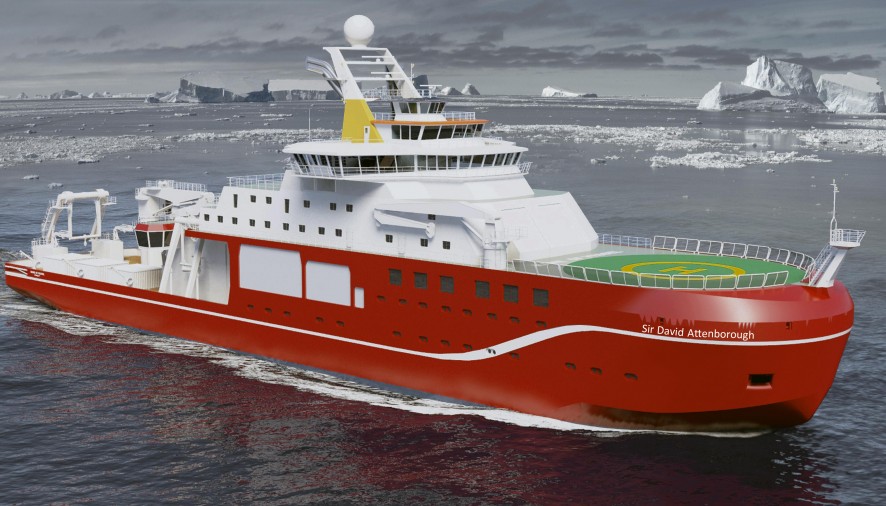If you didn’t already know, the newest of Britain’s polar research ships is to be called the RRS Sir David Attenborough; a distinguished title indeed, but certainly much less fun than Boaty McBoatface.
Of course ‘Boaty’ is a silly name, one that doesn’t hold any great scientific weight like a Newton or a Darwin, but why should it be deemed any less appropriate than Attenborough? This is certainly not the first time a ridiculous name has been considered within scientific research. Before the designs for the E-ELT (European-Extremely Large Telescope) were approved, the scientists in charge initially decided to pitch a design truly in keeping with it’s name. Although the E-ELT – currently being constructed in Chile – is set to be the world’s biggest telescope, its original design included an aperture diameter of 100m, which would have dwarfed the final accepted design. This ‘Overwhelmingly’ large telescope design would have been monstrous if built however, sadly, it’s estimated costs mean we probably won’t see anything quite like it for a long time yet.
Astronomy isn’t the only area of science that can get a little bit eccentric with it’s names. Indeed, Boaty would not have been the first silly name for a ship, with a quick google bringing up these beauties:
- Cirrhosis of the River
- Marlin Monroe
- Aqua Holic
- Tug Life
- Unsinkable II
- HMS Gay Viking
- SS Beaverburn
- SS Iron Knob
Evidently seamen have an excellent sense of humour. Joylessly, it has been suggested that the name Boaty McBoatface doesn’t fit with the distinguished research it will ultimately perform – certain ministers believe the name would cause national embarrassment. But this was the name championed by the public! We were given the chance to be a part of the ship, to have a vested interest in its scientific endeavours! Thousands took the time to vote for Boaty, so at a time when public interest in science is incredibly low, surely allowing for the people’s choice to remain would have helped increase and maintain interest in its future adventures and the discoveries it will make.
Science can seem dry and boring – and that’s being kind in some cases – but it’s a necessary evil, quantifying the curiosity of the unknown and recording what we find. In research, we have to name things so others will know exactly what we mean, often years after the research has been conducted. Therefore, there should be scope (not the E-ELT kind) to, where appropriate, inject some humour into somewhat historically tedious area’s of science.
As pointed out by others, this could have been a clever ploy by the NERC (Natural Environment Research Council) to draw attention to themselves and the future research of the ship while safe in the knowledge that they could opt for the name that they preferred. To be fair, they have honored a man who has done so much for the public perceptions of science in his long and distinguished career, who are we to argue with their final decision? Sir David Attenborough had this to say, “I am truly honoured by this naming decision and hope that everyone who suggested a name will feel just as inspired to follow the ship’s progress as it explores our polar regions. I have been privileged to explore the world’s deepest oceans alongside amazing teams of researchers, and with this new polar research ship they will be able to go further and discover more than ever before.”
Although a disappointment to the fans of Boaty, we must remember that it’s the UK’s scientists who are the real winners here. They will have access to a world-leading research ship and, I hope, all those who have taken interest will continue to monitor what it, and it’s crew, accomplish. Costing £200m, the boat formerly known as McBoatface is currently being constructed in Merseyside and is set for its maiden voyage in 2019. The state of the art facilities will include a meteorological weather station, several types of sonar, multiple laboratories and underwater profiling equipment as well a moon pool to allow for the quick deployment of scientific equipment. As consolation for the change of name, one of the ship’s remote deployable submarines is to be dubbed Boaty McBoatface so at least, and quite rightly, the name will play a part in the research undertaken.
The RRS Sir David Attenborough will join NERC’s other research vessels the RRS Ernest Shackleton, primarily a logistics vessel, and the RRS James Clark Ross. These ships support Britain’s Arctic and Antarctic research operations including multiple research stations and labs. In addition to the major research areas of climate and climate change, NERC also work in the fields of atmospheric physics and chemistry, ecology, biodiversity, tracking ice movement and geoscience.
Sam McMaster and Dougie Philips
Image courtesy of NERC (Natural Environment Research Council).

